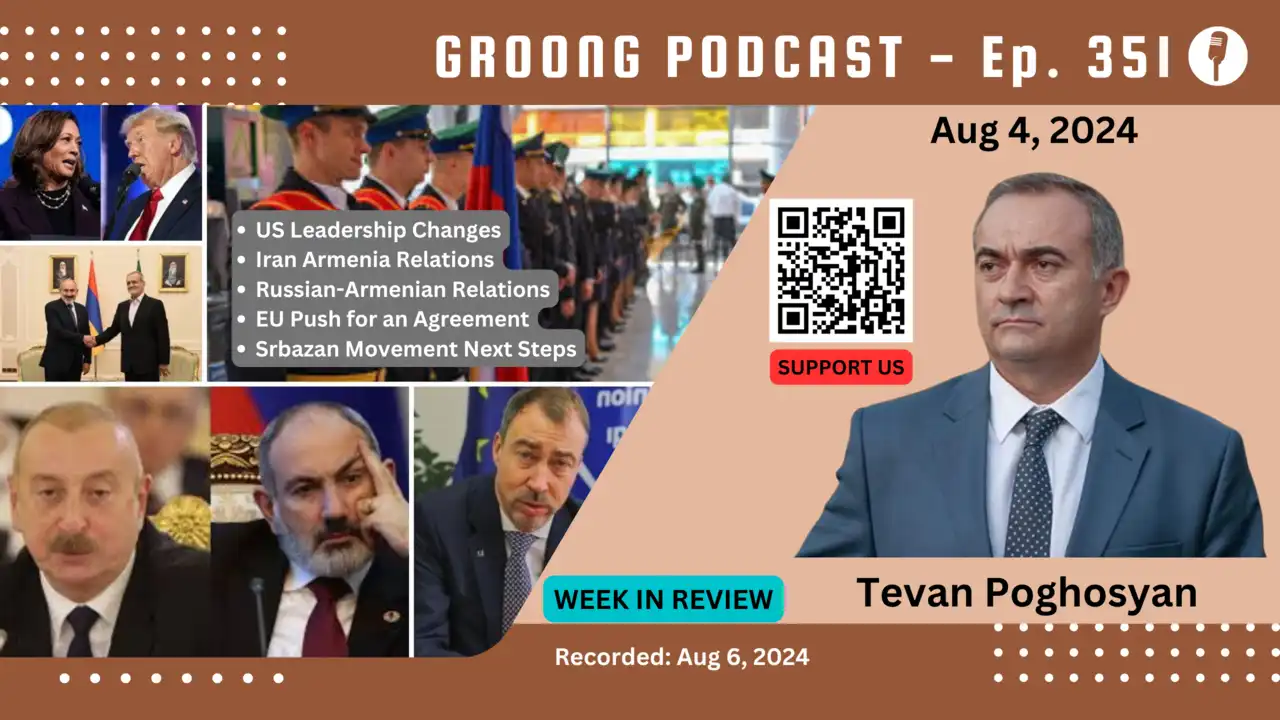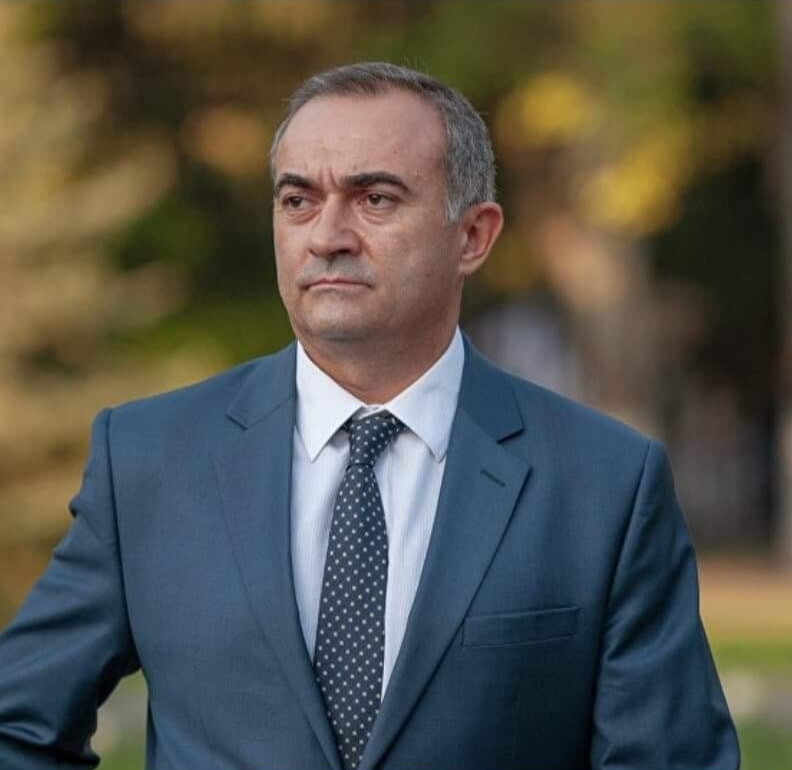
Groong Links:
Guest:
Topics:
- US Leadership Changes
- Iran Armenia Relations
- Russian-Armenian Relations
- EU Push for an Agreement
- Srbazan Movement Next Steps
Episode 351 | Recorded: August 6, 2024
Show Notes
US Leadership Changes
As the field of the major candidates for President of the United States (POTUS) solidifies, we’re now looking at a change of administration in January 2025, as Biden steps down and either Trump, or Kamala Harris steps up.
Questions:
- Can you talk about the effects of a Trump, or Harris presidency on Armenia and the Caucasus? What would be the key distinguishing policy differences?
- Did Trump’s preoccupation with his reelection in 2020 provide Aliyev with an opportunity to attack Artsakh?
Iran Armenia Relations
On July 28th, the new Iranian president, Masoud Pezheshkian was inaugurated. Pashinyan attended the events in Tehran and also met with Ayatollah Khamenei, as well as Pezheshkian. Tehran reiterated its red lines regarding corridors through Armenia and encroachments on its territory by Azerbaijan and Turkey.
The message to Pashinyan was that the change of presidents did not change Iran’s policy about the Caucasus, and they remain firmly opposed to any Azeri land corridors through Armenia.
Questions:
- As much as this might sound like support to Pashinyan, is this a warning to Armenia, as well as to Azerbaijan and Turkey? In what way?
- Is Pashinyan “hearing” the message?
- That he should not be making a deal with the West, that compromises its own territorial integrity.
Russian Armenian Relations
Earlier this year in Moscow Putin agreed with Pashinyan that on August 1, Russian customs & border officers would hand over their duties at Zvartnots airport in Yerevan to Armenians. That was this past week, so now Armenia has taken over duties at the airport. They even conducted a transfer ceremony and they are now out of Zvartnots.
Russia at the time warned Armenia of “irreparable damage” to relations if Armenia continued on this path.
Questions:
- Is control of customs and border at Zvartnots so important as to irreparably damage relations between Russia and Armenia, or is another step in the disengagement between the two countries? At what point is the Russian red line crossed?
- For now the Russian servicemen have been redeployed to Armenia’s borders. Where do you see this process headed, is this a process of removing all of Russia’s military services out of Armenia?
- Armenia’s economy is heavily dependent on Russia. Even the re-export economy is primarily destined for Russia. What “irreparable damage” can be expected from Russia?
- What does the Russian withdrawal from the airport mean in the larger scheme of things? Is it a sacrifice that Russia can make easily?
Armenia in Orbit
US diplomats have very clearly expressed that the US is pursuing a policy of breaking Armenia out of Russia’s orbit, by helping it reduce its economic and energy dependency on Russia.
Yet, around the same time, Armenia announced a new loan of $200 million from the Eurasian Fund for Stabilization and Development, with an additional $190 million in co-financing from the Armenian government, for construction of a tunnel in Kajaran. The Eurasian Fund for Stabilization and Development is led by various EAEU countries, with Russia at its helm.
At the same time, Armenia’s trade with Russia, UAE and China has skyrocketed, and trade with the USA and Germany has dropped significantly.
Questions:
- At a time when the US & EU are outwardly pushing Armenia away from Russia, why aren’t they able to compete with the Russian-bankrolled EDB?
- How do you explain this incongruence between Armenia’s own actions and words?
- How can the West adjust its policy towards Armenia to make it less adversarial, and to the greater benefit of the people in the country?
- Do Armenian oligarchs have any say in Armenian policy towards Russia, since the re-export revenues largely line their pockets?
In Episode 345 of our podcast, we discussed the results of a recent poll released in July. The poll revealed significant support (some would say an irrational amount of support) for Armenia joining the EU. This despite all we’ve said so far on Armenia’s economic reliance on Russia. An alternative is to leverage the country’s unique position as a bridge between East and West in order to drive its development and growth.
Or at least that’s how one narrative goes.
Questions:
- How serious is the Armenian government about joining the EU?
- Surely Armenia’s EU partners, while they talk about helping Armenia “break” from Russia, are seeing all of the increased trade and reliance on Russia. How serious are both sides about Armenia’s EU prospects?
- Why are so many Armenians blindly rooting for the EU? What needs to be done in order to present this topic objectively by the media and analysts?
EU Push for an Agreement
With weeks left in his role as the EU Representative to South Caucasus, Toivo Klaar appeared in the news this week saying that Karabakh Armenians should be part of the normalization process between Armenia and Azerbaijan. Meanwhile, as we’ve talked before on this podcast, Azerbaijan is trying to transform the discussion into “all refugees are equal” and refugees from the first war should be allowed to return in parallel with Artsakhtsis. The concept of so-called “Western Azerbaijan” is being pushed officially by Baku.
Questions:
- What are your thoughts about the role of Toivo Klaar in this conflict over the number of years?
- Who has leverage over Azerbaijan to compel them to agree to some international guarantees for Armenians?
- Is it possible for Artsakhtsis to return in light of the current reality on the ground? And under what conditions can Armenians return?
- How can Armenia avoid the trap of putting an equal sign between Artsakh refugees and refugees from the first war?
Srbazan Movement
The Srbazan movement, which started in Tavush and moved to Yerevan, generated significant social activity, with the largest crowds since 2018. Initially, Srbazan gave Pashinyan deadlines to resign but hasn’t succeeded. After the June 12 violent crackdown against peaceful protesters, the movement is regrouping while the government is on vacation and parliament adjourned. Srbazan continues to engage with various groups in the regions and Yerevan.
Question:
- Why hasn’t the movement succeeded so far? Are there any lessons learned advice you can give to the organizers? What is missing from the formula for success?
Thoughts from the Participants
- Hovik: Join the online movement to point out Azerbaijan’s effort to greenwash its history of ethnic cleansing and abuse of human rights through the #COP29 conference in Baku in November.
- Tevan: Remember, celebrate and promote Artsakh Independence day on September 2, especially in the Diaspora.
Wrap-up
That’s our Week in Review, we hope you found it helpful. We invite your feedback and your suggestions, you can find us on most social media and podcast platforms.
Thanks to Laura Osborn for the music on our podcasts.
Guests

Tevan Poghosyan
Tevan Poghosyan is president of the International Center for Human Development. Mr. Poghosyan was an MP in the National Assembly between 2012 and 2017 from the Heritage party. From 1997 to 1999 he served as the Nagorno-Karabakh Public Affairs Office Director in Washington, D.C.
Hosts

Hovik Manucharyan
Hovik Manucharyan is an information security engineer who moved from Seattle to Armenia in 2022. He co-founded the ANN/Groong podcast in 2020 and has been a contributor to Groong News since the late 1990s.
Disclaimer: The views expressed by Hovik Manucharyan on the ANN/Groong podcast are his own and do not necessarily reflect the opinions of his employer or any other organization.

Asbed Bedrossian
Asbed Bedrossian is an IT professional, and for years oversaw the central IT enterprise infrastructure and services at USC. His decades of experience spanned across IT strategy, enterprise architecture, infrastructure, cybersecurity, enterprise applications, data center operations, high performance computing, ITSM, ITPM, and more.
Asbed founded the Armenian News Network Groong circa 1989/1990, and co-founded the ANN/Groong podcast in 2020.